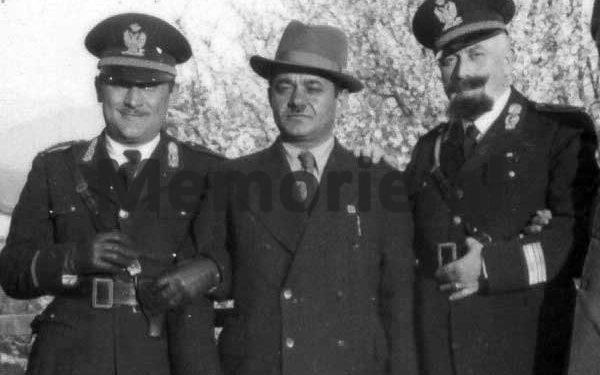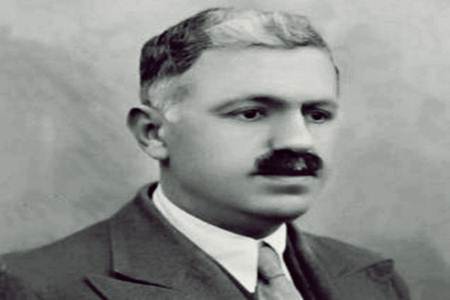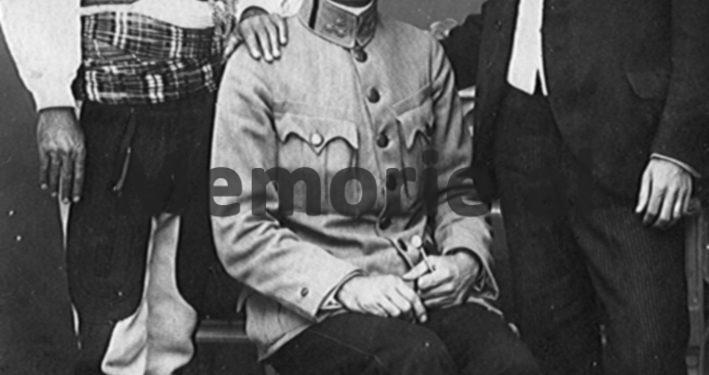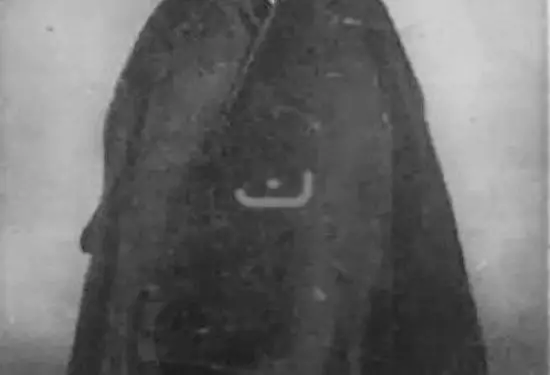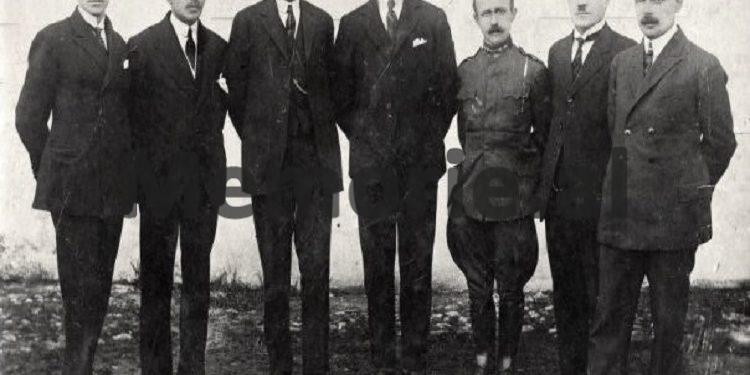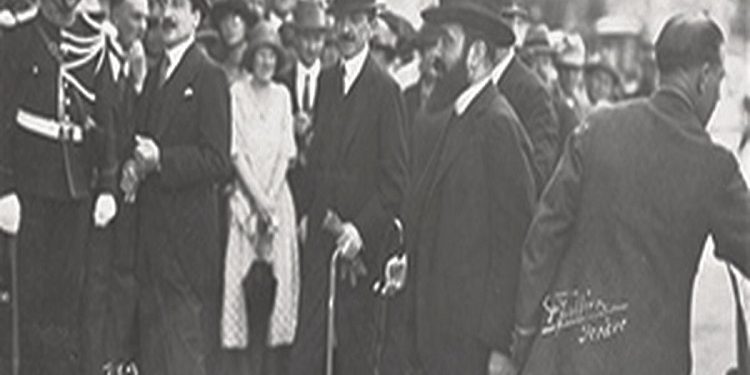By Hamid Gjylbegaj
The fifth part
HISTORICAL EVIDENCE 1912 – 1925
(Some biographical memories of Hamid Gjylbegaj)
Memorie.al / I were born in Shkodër on March 1, 1888. I received my first lessons in my hometown, in the Turkish, Mejtepe and military schools. I finished the last year of the military gymnasium in Manastir, from where I went to the Military Academy of Turkey, in Istanbul. After finishing school, I was appointed a lieutenant in the Fifth Corps of the 13th Division of the 38th Regiment of Thessaloniki, where I served until October 1912. During this time I fought in Kumanovo, Prelep, Bitola (where I was wounded twice) and finally in the Castle of Ioannina, in Bizhan, until February 28, 1913. For military actions during the war, as a distinguished officer, I was prematurely promoted to the rank of lieutenant. I entered the military history of the Balkan War as the first officer in the world to discover, on the basis of ballistics science, that the German 7.50 mm field automatic cannons, compared to the French 7.50 mm. were inferior. It was a technical mistake by the Germans, who made the cannon barrels 25 cm. shorter than the French cannons, which later, in the First World War, was also discovered by the Chief of Staff, General Ludendorff. My report on this matter is in the military archives of Turkey. With the surrender of the Ioannina Castle on March 6, 1913, the entire Turkish high command, of which I was also a part, was taken prisoner of war. As a prisoner of war, I spent seven and a half months on the island of Zanta (Zaqinthon). With the signing of the Peace Treaty, in October 1913, I moved to Istanbul.
Continues from last issue
Second election (December 1923)
Before the elections began, Zogu wrote a letter to Shefqet Vërlac, in which he asked him to nominate me the deputy of his group. For this, Vërlac sent me Hasan beg Biçakçi to ask me if I wanted to.
Knowing that I could not become a deputy, I told him that I could not run in a foreign country, between two groups, Aqif Pasha and Vërlac. After all, the stone weighed heavily in its own country, and I would bring the candidacy to Shkodër.
If I ran for candidacy in Elbasan and didn’t win, the Catholic clergy would say that if I had run in Shkodër, he would have kicked me out as a deputy.
But when I didn’t hear about becoming a deputy in Elbasan, as the deputy of Vërlac, Zogu thought that I was connected to the Catholic Clergy. But he judged wrongly, because the fact turned out differently.
On the occasion of the elections, the third group appeared in Elbasan and took the name “As i beut, as i pasha”, with Ahmet Dakli and Lef Nosi.
A big fight broke out between the parties, so the state was forced to impose a curfew. They fired the prefect Izet Dibra (Shatku) and to maintain order and neutrality, they appointed Shefqet Frashëri in his place. Order passed into the hands of the army, and it was ensured that the polls were free. Shefqet Vërlaci won a large majority of votes.
My intervention in the creation of the coalition
Seeing the great crisis created between the parties in all of Albania, I proposed to Shefqet Vërlac to intervene with the Shkodra group, in which I had influence, in order to establish cooperation between them. To form a coalition cabinet with the composition of the Catholic Church.
For this purpose, I went to Shkodër and talked with Monsignor Lazër Mjeda, who laid down some conditions for me: “We Catholics, until the time that Albania came to its senses, were raja. Now we have equal rights with Muslims. But, since the Albanian Muslim element is the majority, the rule belonged to them. We will accept the form of the state as they wish. In Dutch Monarchy, in Dutch Republic, but in the European form. No, he told me one thing and did another.
Muslims must sign the concordat with the Pope, as all other countries of the world have, but on the condition that the religious capitulation of Rome, as they had in the time of the Turks, does not follow.
Every senior official who is appointed in Albania should be given his autobiography from the time of the Turks until the day of the appointment and this appointment should be made by decision of the Ministerial Council, and not according to the wishes of each minister.
Even the covert expenses should be used through the Ministerial Council and not only through a single individual, the minister. The Ministry of Justice should be independent from the state. We should not be allowed to solve the problem of religion between Catholics and Orthodox because we have been separated for 1650 years and we cannot solve them. Nor should it be imposed on us to follow a Slavic policy, because the Albanian nation has been with them for 400 years.
The freedom of religious education only in primary schools, because without religion all Bolshevism is done, because a rotten apple rots our basket. This form of state is the civilized form of democratic Christian culture. Who will put this line into practice is not known”.
I submitted these points to Vërlac. He accepted them, but when he came to implement them, he encountered great contradictions. After all, Shkodra, as the largest prefecture, required two ministers, of Finance and of the Army, but Ahmet Zogu did not accept this condition, and the matter remained pending.
Since Shefqet Vërlaci was not able to carry out the agreement with Shkodra, because Zogu would not let him, I finally informed Shkodra.
The threshold of the June 1924 Uprising
After the wounding of Zog on February 23, 1923 and the murder of Avni Rustemi (April 20, 1924), events precipitated. When Vërlaci, Zogu and Mufit Libohova saw that the situation was moving towards the movement, they sent me to Shkodër to once again propose to Luigj Gurakuqi with his friends, to form the cabinet, as they wanted. But Shkodra refused, saying that he had already connected with Vlora.
I returned to Tirana, I informed Vërlac that there was nothing stopping the movement and that I was going to Elbasan, to save myself. However, on this occasion, Bajram Fevziu intrigued, telling Zog that Hamid went to Elbasan to take the battalion and occupy the road to Homeshti, to prevent your departure to Yugoslavia.
The bird, believing the words of Bajram Fevzi, ambushed me in Qafë Krrabë, which with great difficulty and skill, I was able to escape alive.
After the return of Ahmet Zogut from Yugoslavia, he gathered the leadership of the northern mountains to establish allegiance and cooperate with them. Among them was Dash Ago Dizdari, also a close friend of mine, from the parish of Puka. Before going to Tirana, he came and met with me.
On this occasion, I told him to ask Zogu from me why he ambushed me in Krrabë. Zogu was strongly impressed by this question and said that Bajram Fevziu had been intrigued by this and he would reveal it later. When we met later, Dash Aga told me that, if he had known that Zogu would be so affected, he would never have asked him that question.
June 1924
Before the June Uprising took place, the battalion commanders of all Albania gathered in Tirana, near the general command. Bajram Fevziu wanted to ensure cooperation with the Ministry of War from the officers, for which they also received the signatures. The purpose of Bajram was to support the Bird.
But, after this work was dictated, the officers, among whom I was, each acted as they wished, discussing the issue of the Movement in private.
At this meeting, I specifically asked who was leading this movement. They told me Fan Noli. Then I objected, remarking that Noli was the Moscow move they wanted to make, it was bound to fail because the Western and Balkan states would not allow a Bolshevik state in the Balkans.
For this reason, I told my friends that I could not participate in the movement, but, nevertheless, I had nothing to fight against them. I told you that the duty of the army was to keep the state afloat, while the events that took place (the murder of Avni Rustemi) were pursued by legal means, through the Ministry of Justice. In my opinion, it should not be a spontaneous movement which would harm the nation of the homeland. I told him that my words were about to come true.
All the officers, except mine, returned to their battalions and took part in the movement. Thus, the truth is that the June Movement was made directly by ten Albanian battalions. Neither Fan Noli, nor Luigj Gurakuqi with their party, was good enough to go shopping, not to mention the June Uprising.
The coming to power of Noli and the northern opposition
After the victory of the uprising, the government of Fan Noli came into power. I made a plea to the Ministry of War and asked them to retire. This was not accepted.
At this time, I was sent to Elbasan; captain Qamil Baki, to hand over command of the battalion. After I handed over the account and the command, I paid all the debts owed by the battalion with the private cash, received the documents for the orderly delivery of the duty and remained at the disposal of the state, until the arrival of Zog in force.
Zog’s coming to power in 1925
With the return of Zog to power, due to political distrust, he retired 13 officers from the old ones, one of them laughs at me who had resigned at the beginning of the June Movement.
The day that Zogu entered Tirana, going home accompanied by Gjergj Gurakuqi, I took off my military shoulder straps and threw them away, saying that after this day, I will never serve the Albanian state as an officer again.
That’s how I ended my military career. After 2-3 days, Sali Vuçiterna came to my house together with Shefqet Mukë, to propose to me the position of chairman in the Council of the Muslim Committee, to work in the magazine “Zani i Naltë i Drita”.
The purpose of this proposal was for me to be in Tirana and make some sort of compromise with Ahmet Zogu. I told you that I came to Tirana under the condition that Zogu would not interfere either in the organization and use of the assets of the waqf in Albania, nor in the appointment of the council of the “Zani te Nalte te Drita”.
Since Sali Vučiterna did not accept this condition, then I did not accept his proposal either, just to get a salary there. Muharrem Bajraktari appeared after them and proposed to me that we go together to collaborate with Zogu. I replied that I had given up, once and for all, official work, and would never participate in state work again.
How did Ahmet Zogu return to Albania?
In 1919, Ahmet Zogu became a member of the “National Wing” and, together with Hoxha Kadri, aligned himself with the lodge of the Intelligence Service of England, which had been founded in Shkodër by General Phillips.
At that time, the issue of kerosene was discussed in the Albanian parliament. Two proposals were made, one from the English and the other from the Americans. The American proposal was more favorable, because they paid 12.8%, immediately starting the exploitation, building a filtration factory, as well as employing 100 thousand Albanians.
Luigj Gurakuqi thought that with kerosene revenues, 50 million gold francs and an internal loan of 50 million gold francs, he would establish the National Bank of the Albanian State. Through it, he used all the mines of Albania, and then developed the nation’s culture in every aspect.
Meanwhile, the English offer gave about 11.5% and wanted to isolate the kerosene wells and keep them in reserve to use them when needed. This course of action hindered the economic development of Albania. However, for the sake of his chair, Zogu defended this thesis. So the parliament split into two groups and went into fratricide and the June Movement of 1924.
Zogu was supported by the English, who paid him 10,000 gold napoleons, to come to power. Pashiqi helped him with the VI Korparmata of Skopje, supported by the various Albanian popular forces on the Yugoslav side and with the Vrangelist division, Ahmet Zogu returned to Albania where at first he proclaimed the Albanian Republic and later resigned and proclaimed the Monarchy. Memorie.al (Prepared by Dr. Shefqet Deliallisi)




